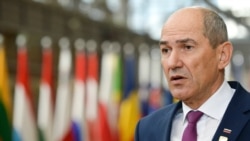The dismissal of Radio Television Slovenia's (RTV) director of television programming has reignited charges of political pressure on the country's influential public broadcaster.
Andrej Grah Whatmough, RTV's chief executive, dismissed Natalija Gorscak on August 20, citing poor ratings and management differences.
But Gorscak maintains that she was fired for refusing under pressure to dismiss the managing editor of RTV's news and current affairs department, Manica Janezic Ambrozic.
Gorscak and analysts who spoke with VOA see the dismissal as another sign that Prime Minister Janez Jansa's government is looking to bring Slovenia's independent media to heel.
Since Jansa's center-right party took power in 2020, media analysts say, the government has attempted to increase control over RTV and the state news agency, STA, and that the prime minister and allies have tried to intimidate journalists on social media.
Jansa's supporters counter that the country's media is biased in favor of opposition political parties and that public media are often reporting unfair or false news.
After one of RTV's programs last year criticized a government plan to raise the pay of high-ranking officials, Jansa used Twitter to accuse the broadcaster's news programs of disseminating untruths.
"Don't spread lies @InfoTVSLO We pay you to inform in these times and not to mislead the public. Obviously there are too many of you and you are overpaid," Jansa said in the tweet.
Gorscak has worked for RTV almost continuously since 1996. She disputed allegations of biased reporting and falling ratings under her tenure.
"We are a public television — not a state television. It is our job to oversee the work of each government. We work according to professional standards, and each government has always criticized us, which is how it should be," she told VOA.
Gorscak said political pressure on RTV has never been as bad as under Jansa. "The government wants to ensure that TV journalists will report according to its wishes, particularly ahead of parliamentary elections," she said.
Slovenia will hold regular parliamentary elections in the second quarter of 2022.
Motives questioned
The Vienna-based International Press Institute said justifications for Gorscak's dismissal "appeared questionable."
"It is hard to avoid the conclusion that the sacking [firing] was the result of strong political pressure aimed at sweeping out staff and overseeing a shift in editorial position to one more pliant to the government," IPI Europe advocacy officer Jamie Wiseman told VOA.
"IPI is concerned it will now open the door to the dismissal of other editorial staff in the crosshairs of the ruling party. If such controversial changes continue, the broadcaster's editorial independence will be jeopardized further."
It already may be eroding.
RTV journalists contacted by VOA espoused differing views about the level of pressure. Still, some described how they self-censored after online attacks by government officials. Four journalists spoke to VOA on condition of anonymity because of potential retaliation.
"After a critical story, it is not just government officials who attack you on platforms like Twitter, but also a number of other, often anonymous people, who I believe are connected to the government," one RTV journalist said. "As a result, many journalists resort to self-censorship in order to avoid trouble."
Critics say RTV's new chief Whatmough was installed to promote the government's agenda, although Whatmough and others in the government reject that assertion.
Whatmough took over in April after being elected by the broadcaster's Program Council — a 29-member body mandated to act independently. The majority of council members, 21, is appointed by the parliament.
Prior to that, Whatmough was a member of the RTV's Supervisory Board since 2015. He was first nominated to that position by the Party of Modern Centre, now a junior party of Jansa's government coalition, local media reported.
Jansa has not commented on the changes at RTV, and Whatmough and RTV have not responded to VOA's questions about the controversy.
In an interview with news website Siol.net, however, Whatmough said Gorscak's firing was "based on professional arguments" and that he was disappointed it had been politicized.
"The director [Gorscak] did not support any of my proposals [for program changes], but an even bigger problem was that she did not have any proposals of her own," Whatmough was quoted as saying. He denied being under any political pressure.
Aggressive posture
Marko Milosavljevic, a professor of journalism at the University of Ljubljana, told VOA that "every government wants to have an influence on the public media; every politician wants to have a lot of positive media attention."
But "the situation at present is very different from the past," Milosavljevic said, "because the situation has never been so legally unfounded, aggressive and vulgar."
He cited unsuccessful attempts to fire previous RTV CEO Igor Kadunc last year and a draft media law proposed by the Culture Ministry that would have cut one of the main sources of funding for the broadcaster.
The draft never made it to parliament after protests from the opposition, academics and journalists.
Peter Jancic, editor of Siol.net and a former member of the Program Council, dismissed claims the Jansa government was interfering.
"There is a constant battle going on as the left-wing and the right-wing parties want to increase their influence on the public television, particularly ahead of general election," said Jancic. In spite of that, "most journalists at RTV Slovenia are trying to do their job professionally and impartially," he said.
Siol.net, which is owned by the state-run telecommunication operator Telekom Slovenia, is widely viewed as pro-government.
'Entirely autonomous'
Slovenia's Culture Ministry, which oversees media policy, also denied that RTV's journalists are under political pressure or that Whatmough is pro-government.
"The CEO is entirely autonomous in his decisions and has a wide support of the Program Council — he is supported by members who are in their beliefs close to the left side of the political spectrum as well as by those who are closer to the right side," the ministry said in a statement to VOA. Vasko Simoniti of Jansa's Slovenian Democratic Party is the minister.
"The Slovenian government respects the freedom of expression and the media freedom. Indeed, pressures on individual journalists exist, but that has been happening continuously also in times of previous governments," the statement added.
Laurens Hueting, senior advocacy officer for the European Center for Press and Media Freedom, said the Jansa government's efforts to influence media have not reached the level of Hungary or Poland, where leaders have moved to squelch independent reporting.
But that is changing, he said.
"Slovenia still has high levels of press freedom and media pluralism," Hueting said, "but the current government is attempting to reshape that landscape by boosting its own propaganda channels, expanding control over RTV and press agency STA, and undermining critical journalism."





